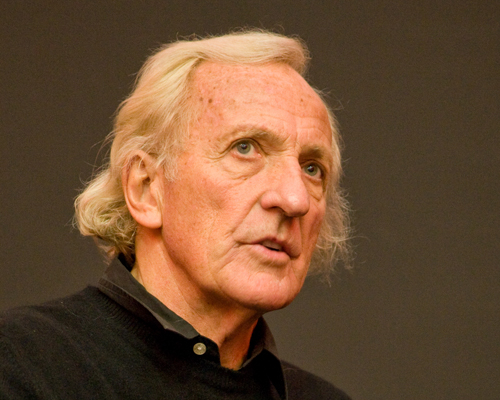Update: A video of the entire talk is now available online. It is embedded at the end of this article.
John Pilger, a legendary journalist and documentary maker, discussed “Why journalism matters” on Monday, October 12th, with Professor Richard Keeble, from the Lincoln School of Journalism.

Mr Pilger opened the School in November 2004 and, at the end of his talk, he and Professor Keeble announced to the public that the University of Lincoln will build and host an archive of Mr Pilger’s work, as well as assist in the re-design and re-launch of his website, JohnPilger.com.
When asked at the start of the discussion why the craft mattered, Mr Pilger said that “embodied in journalism are basic freedoms. Freedom of speech, the right to know”.
“Without that power, that information… there can be no participation that we call democracy.”
However, he said, “that’s not the way it’s practised. You’ve just had a little bit of utopia.”
“I think it’s important for young journalists to understand that a scepticism is important. Not of people. Some young journalists believe that a scepticism about people preordains them. There should be a scepticism about power.”
In an email interview with The Linc before the discussion, Mr Pilger said that “like almost everything, there is the good, the bad, and the indifferent.”
“Journalism matters, in my view, when it tells the stories of people, rather than acts as the agent or conduit of power and the status quo. That can apply in all sections of the craft, from foreign reporting to sports reporting.
“Our lives are dominated by the insidious propaganda of authority; journalism ought to be an antidote.”
“Journalism has been best served by the honourable exceptions,” he said. These are “exceptions to a system that is little more than an extension of the established order.”
“You need to look at the ‘samizdat’ on the world wide web… Once you’ve learned to trust certain writers and sites, you can create your own reliable world of reportage and truth-telling.”
You can find a list of such sites on JohnPilger.com.
“We are truly the agents of people,” he said, whereas “so-called ‘mainstream’ journalists are agents of established power.”
He disputed the label of “mainstream”, preferring to label it “corporate”, as the most prominent media outlets are often controlled by large corporations. “Those whose journalism is meant for the most people are the mainstream.”
When asked by The Linc about “alternative” media, Mr Pilger said it “is the real mainstream, because it’s more in tune with reality, facts, and people. I think the public is beginning to see the corporate media as a system of propaganda, a monoculture whose differences — rather like party politics — are illusory.”

Mr Pilger also criticised the BBC, saying that it also represented “vested interests”, whilst agreeing “with the institution of the BBC”.
“The elite that runs it… I don’t think represents the people that put their faith in the BBC.
Referring to then-BBC journalist Andrew Gilligan’s 2003 report on the government’s “sexed up” Iraq dossier, which made ludicrous claims about that country’s military capabilities, Mr Pilger said: “When the BBC got a bit close to the truth they fired the Director General and the reporter that told the truth.”
Mr Pilger said that important journalistic work can be done anywhere in the world. “You don’t need to go to Baghdad or Afghanistan. Reporting the way power presents itself… that can be done here.”
